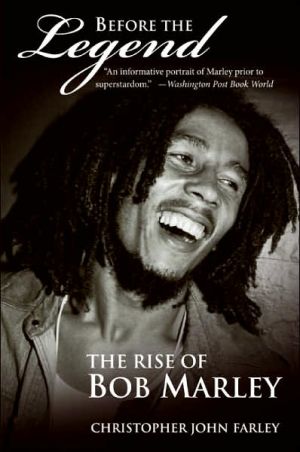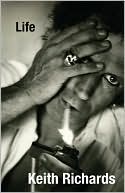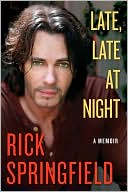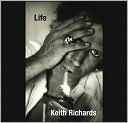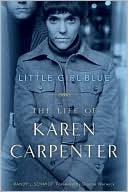Before the Legend: The Rise of Bob Marley
Bob Marley was a reggae superstar, a musical prophet who brought the sound of the Third World to the entire globe. Before the Legend: The Rise of Bob Marley goes beyond the myth of Marley to bring you the private side of a man few people ever really knew. Drawing from original interviews with the people closest to Marleyincluding his widow, Rita, his mother, Cedella, his bandmate and childhood friend, Bunny Wailer, his producer Chris Blackwell, and many others—Legend paints an entirely fresh...
Search in google:
Bob Marley was a reggae superstar, a musical prophet who brought the sound of the Third World to the entire globe. Before the Legend: The Rise of Bob Marley goes beyond the myth of Marley to bring you the private side of a man few people ever really knew. Drawing from original interviews with the people closest to Marleyincluding his widow, Rita, his mother, Cedella, his bandmate and childhood friend, Bunny Wailer, his producer Chris Blackwell, and many others—Legend paints an entirely fresh picture of one of the most enduring musical artists of our times. This is a portrait of an artist as a young man, from his birth in the tiny town of Nine Miles in the hills of Jamaica, to the making of his debut international record, "Catch a Fire." We see Marley on the tough streets of Trench Town before he found stardom, struggling to find his way in music, in love and in life, and we take the wild ride with him to worldwide acceptance and adoration. From the acclaimed journalist, Christopher John Farely, the author of the bestselling AALIYAH and the reporter who broke the story on Dave Chappelle's retreat to South Africa, Legend is bursting with fresh insights into Marley and Jamaica, and is the definitive story of Marley's early days. Library Journal The Jamaican-born Farley, a former senior editor at Time, celebrates reggae king Marley 25 years after his death. Copyright 2005 Reed Business Information.
Before the Legend\ The Rise of Bob Marley \ \ By Christopher Farley \ HarperCollins Publishers, Inc.\ Copyright © 2006 Christopher Farley\ All right reserved.\ ISBN: 0060539917 \ \ \ Chapter One\ Stir It Up\ \ In the summer of 2005, I traveled to the town in which Bob Marley was born in order to see the place where he was buried. Marley's hometown is Nine Miles, Jamaica, a small village in the parish of St. Ann that is a three-hour car ride from the capital city of Kingston. Getting there is a hilly, winding drive, and the road, at times, is about one and a half lanes across, forcing drivers to play periodic games of chicken with various vehicles -- cars, buses, trucks laden with day laborers -- speeding down the slopes in the opposite direction. I was born in Kingston, but I left the island when I was young and I can't do many basic Jamaican--y things. I can't, for example, tell you a single thing about the rules of cricket. I don't speak with a Jamaican accent and I can't fake one convincingly. I can't drive on the left on hilly twisty roads. I pressed on anyway. I had arranged a meeting in Nine Miles with Cedella Marley Booker, Bob's mother. She had grown reclusive in recent years and gave very few interviews. But Chris Blackwell, one of Marley's producers and the founder of Island Records, interceded on my behalf, and Mother Booker agreed to grant me an audience. At thispoint, I had been working on a book about Marley's life for several years. I had interviewed Marley's family members, friends, and fellow musicians. I had unearthed crumbling old print interviews of Marley and listened to scratchy home recordings he had made but never released. I had visited his old haunts in Trench Town and throughout Kingston. I had been given unreleased recordings of the Wailers conversing in the studio so I could get insight into how they created their music. Now I wanted to finish my book where it had all started, and where it had all ended as well.\ This is a book about beginnings. The period before fame arrives is the time when most artists collect the raw life stuff that will form the core of their work. Once a musician starts writing about how hard life is on the road, and the predation of the paparazzi, it's generally over. He has lost touch with the real experiences that connect ordinary listeners to his music. In many if not most cases, an artist's initial years of struggle represent the most interesting period of his or her career. Music legends often end their lives in strikingly similar circumstances -- burdened by celebrity, hooked on drugs, haunted by the inability to live up to the greatness of earlier work. Fame can homogenize an artist, blurring parts of his identity so critics can slot him into pop cultural trends or the public can use him to fill national psychic needs. Or fame can caricature a star, exaggerating his original characteristics into something cartoony, grotesque, and sometimes unrecognizable as human. Bob Marley died young, but he managed to avoid many of the most common pitfalls and pratfalls of rock martyrdom. Marley once opined: "If something can corrupt you, you're corrupted already." He was not a drug addict (unless you count ganja). He did not die broke (though his money was poorly managed during his lifetime). And he was not all that conflicted about success (he used to joke to journalists that he drove a BMW because it stood for Bob Marley and the Wailers). He lived and died for music, but in the end it was not music that killed him.\ Marley's struggle started early. His bandmate Peter Tosh made secret autobiographical recordings called the "Red X" tapes. I was given access to parts of those tapes that have never been published. On them, Tosh discusses the obstacles that stood in his way, and in Bob's way, when they were young. "I began to realize that I was coming in close confrontation with devils daily in the flesh," Tosh says. "I realized that hell is not down yonder, but right here among men. . . . But I never fear the devil."\ Bob's early, dry seasons forced him to put down deep roots. "Yeah, mon, let me tell you something 'bout me," Marley said during a visit to Philadelphia in 1979. "You see me -- Negro in a sufferin' environment. I don't know how to live good. I only know how to suffer. You unnerstan? So anywhere you see me, I'm sufferin' all the while. Me don't really change . . . What is big life to some people, that is not what I call life. What I call life is I wake up and drink a likkle fish tea. Me don't know about the big life."\ Blackwell recalls stopping by an upscale store in St. Martin with Marley during a world tour in 1980. It was one of the few times he ever saw Marley become furious. Inside the store, the proprietors questioned whether Marley had the money to buy their goods. When he promptly produced a wad of cash, he was interrogated about whether he had stolen it. Meanwhile, in the street, a crowd of fans had gathered to catch a glimpse of the reggae star. "Inside the store he was a thief," says Blackwell. "Outside, he was a hero."\ Marley's mother is black, his father accepted as white. Very little had been known about the "white" side of Marley's family when I started this biography. The "white" part of Marley's family tree had been dismissed as fallen leaves -- tattered remnants of another season, and not worth chasing. It is unclear in every book published on the singer whether Marley's father was Jamaican or British or even exactly how old he was. Even Bob's mother was foggy on key facts about her husband. My research, however, led me to relatives on Marley's father's side of the family. Chris Marley, a great-nephew of Bob's father, has served as a kind of family historian over the years. He has spent hundreds of hours researching . . .\ \ Continues... \ \ \ \ Excerpted from Before the Legend by Christopher Farley Copyright © 2006 by Christopher Farley. Excerpted by permission.\ All rights reserved. No part of this excerpt may be reproduced or reprinted without permission in writing from the publisher.\ Excerpts are provided by Dial-A-Book Inc. solely for the personal use of visitors to this web site. \ \
\ Library JournalThe Jamaican-born Farley, a former senior editor at Time, celebrates reggae king Marley 25 years after his death. Copyright 2005 Reed Business Information.\ \
